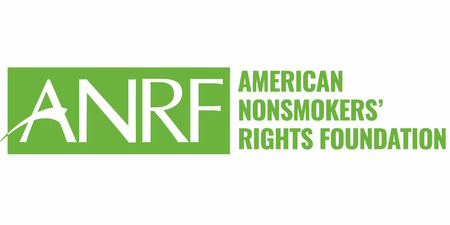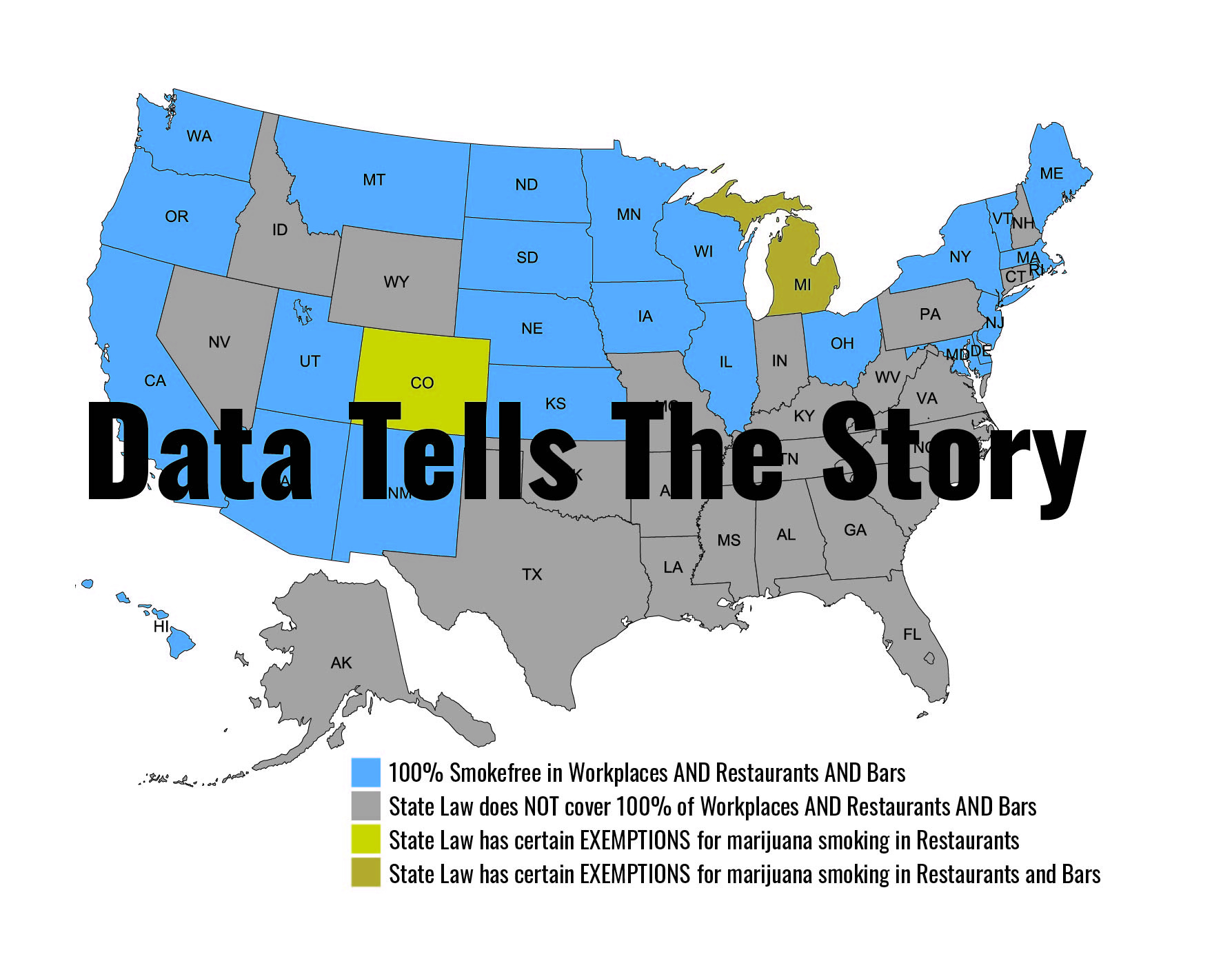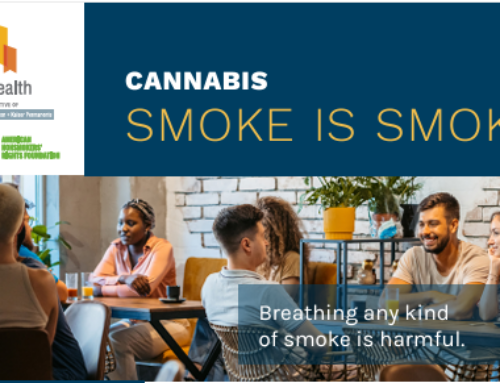The ANR Foundation announces our most recent quarterly update to the lists and maps of U.S. municipalities and states with smokefree laws now in effect. We are very pleased to share that Atlanta, Georgia, has joined the list of 100% smokefree cities, closing gaps in the statewide smokefree law and making all restaurants, bars, hotels, and music venues smokefree, including the use of electronic smoking devices. Several other cities have also joined the ranks of smokefree cities, bringing the percentage of the U.S. population protected by a smokefree workplace, restaurant, and bar (WRB) law to 61.1%.
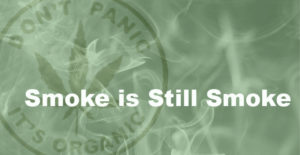 While this is encouraging news, we are facing a significant threat to the percentage of the population protected that’s coming from legalized recreational marijuana laws and provisions that would allow for public smoking and/or vaping of marijuana. We have not made changes to our lists yet, but there’s a real possibility that states like Colorado and Michigan will lose their 100% WRB smokefree status. Examples as to why these places could lose their smokefree status are at the end of this message.
While this is encouraging news, we are facing a significant threat to the percentage of the population protected that’s coming from legalized recreational marijuana laws and provisions that would allow for public smoking and/or vaping of marijuana. We have not made changes to our lists yet, but there’s a real possibility that states like Colorado and Michigan will lose their 100% WRB smokefree status. Examples as to why these places could lose their smokefree status are at the end of this message.
As we enter new legislative sessions, we strongly encourage all of our colleagues, partners, and members to remain vigilant when reviewing proposed statewide or local legislation regarding the public use of marijuana in indoor spaces. Regardless of where you stand on marijuana, we firmly believe that smoke is smoke and vape is vape, and therefore both combustible marijuana and tobacco, as well as vaporized nicotine and THC or CBD, should not be permitted in otherwise smokefree indoor air environments. Secondhand smoke and secondhand aerosol from electronic smoking devices produce a form of indoor air pollution and hazardous particulate matter that is dangerous to nonsmokers. The marijuana industry will continue attempting to wear down policy makers into making concessions for indoor marijuana use and thereby chipping away at smokefree protections. Don’t fool yourselves. Smokefree air is under threat.
The ANR Foundation has a bibliography of U.S. Tobacco Control Laws Database© data users, which contains over 500 studies, reports, and articles. Interested in a data run? Contact Maggie Hopkins to discuss the many options of standardized reports we have available, as well as the special multi-variate analyses that we can run based on your research and policy surveillance data needs.
Did you expect your new law to be included, but don’t see it on our lists? That is either because the law is not yet in effect, or because the law didn’t meet the smokefree list criteria for enclosed non-hospitality workplaces, restaurants, bars, and/or gambling venues to be 100% smokefree without exemptions. Some laws have been enacted so recently that our Policy Surveillance Team has not yet had a chance to order, analyze, and enter them into our Tobacco Control Laws Database. Other laws, in spite of all our searching, fly under our radar. We very much want these laws, so please contact us to check about any law you think we may be missing. Still have questions? Please contact Laura Walpert.
The lists are updated on a quarterly basis. The next quarterly update will be in April 2020.
Become a subscriber. We are member-supported. Contribute to help us keep your organization informed about secondhand smoke policy issues, tobacco industry interference, and more.
Subscriber benefits:
- Daily news summaries
- Weekly research citations
- Priority technical assistance
Remember to check out the Foundation website for smokefree materials and resources, or visit the ANR site for updated smokefree laws and campaign information.
Contact Maggie Hopkins, Director of Data Management and Analysis, if you have questions about our lists and maps.
EXAMPLES of potential smokefree rollbacks:
Colorado recently strengthened its smokefree statewide law by closing gaps in smokefree workplace protections and adding Electronic Smoking Devices (ESDs) to their definition of tobacco products. As the result of marijuana industry pressure and misrepresentation, Colorado legislators also passed a marijuana “hospitality” law, HB19-1230, with very few guardrails, which added an exemption into the newly-enacted modernized Clean Indoor Air Act, amending it to permit marijuana smoking/vaping. This marijuana “hospitality” law rolls back smokefree protections to allow local jurisdictions to opt in so that licensed businesses could “host” on-site use of marijuana/cannabis, including smoking and vaping indoors. Therefore, Colorado could lose its smokefree Restaurant status on our 100% smokefree lists.
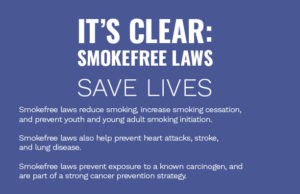 In addition, Michigan recently legalized recreational marijuana. While many state initiatives or legislation have some reference to prohibiting marijuana use in otherwise smokefree environments, Michigan’s new marijuana law does not reference the smokefree law and thus does not prohibit marijuana smoking in places where tobacco smoking is prohibited. The result is that many types of businesses may apply for an on-site marijuana smoking/vaping license, including restaurants, bars, and hotels, as long as they do not permit people under 21 in the consumption space. Therefore, Michigan could lose its smokefree RB status.
In addition, Michigan recently legalized recreational marijuana. While many state initiatives or legislation have some reference to prohibiting marijuana use in otherwise smokefree environments, Michigan’s new marijuana law does not reference the smokefree law and thus does not prohibit marijuana smoking in places where tobacco smoking is prohibited. The result is that many types of businesses may apply for an on-site marijuana smoking/vaping license, including restaurants, bars, and hotels, as long as they do not permit people under 21 in the consumption space. Therefore, Michigan could lose its smokefree RB status.
In contrast to Colorado and Michigan, Illinois has taken affirmative steps, in its newly adopted recreational marijuana legislation, to preserve its smokefree environments. However, we are witnessing a similar, relentless push from marijuana industry and proponents to continuously and repeatedly seek exemptions there. Therefore, while Illinois is in an excellent position at the moment, nonsmokers’ rights advocates must remain vigilant to preserve those protections over time.
Much like with preemption legislation, the industry never gives up in its attempts to undermine or roll back strong smokefree protections. Be aware, and contact us if you have any questions or see suspicious language in local or statewide legislation.
